22/05/19 - 28/05/19
Total distance travelled: 10,600km
I'm sat in my bunk contemplating our second hot drink of the day on this, the second and final morning of our 44-hour train journey from Chengdu to Kashgar. We had talked about "taking a train across China" since the beginning, and so to be sat here right now is quite surreal. Olly and I both occupy top bunks in our four-person cabin. The "soft-sleeper" option was the most expensive, but we weren't in a hurry to relive our experience on the Bangkok overnight train! It has been a comfortable and pleasant enough 40 hours. Olly has just returned from a "full-on, squat-toilet, tap-shower", and he claims to feel "as fresh as a daisy". I will leave it for him to explain the details and logistics.
This train is whisking us away from our time in China and I am sad to be leaving. China has been a real surprise for me: I've enjoyed it here far more than I anticipated i would. Everything from the landscapes, the cycling and the food has been captivating. I remember feeling very nervous about crossing the border into China on our final night in Laos and I experienced a similar onset of fraught nerves the morning we left Shangri-La.
Total distance travelled: 10,600km
I'm sat in my bunk contemplating our second hot drink of the day on this, the second and final morning of our 44-hour train journey from Chengdu to Kashgar. We had talked about "taking a train across China" since the beginning, and so to be sat here right now is quite surreal. Olly and I both occupy top bunks in our four-person cabin. The "soft-sleeper" option was the most expensive, but we weren't in a hurry to relive our experience on the Bangkok overnight train! It has been a comfortable and pleasant enough 40 hours. Olly has just returned from a "full-on, squat-toilet, tap-shower", and he claims to feel "as fresh as a daisy". I will leave it for him to explain the details and logistics.
This train is whisking us away from our time in China and I am sad to be leaving. China has been a real surprise for me: I've enjoyed it here far more than I anticipated i would. Everything from the landscapes, the cycling and the food has been captivating. I remember feeling very nervous about crossing the border into China on our final night in Laos and I experienced a similar onset of fraught nerves the morning we left Shangri-La.
I was willing Olly to say that we should stay another day in Shangri-La, but I was also aware that we had made upcoming arrangements and that although we had a bit of leeway, it wouldn't make sense to actively thwart our plans. Someone we know of had died whilst cycling on the Tibetan Plateau and fellow cyclists, whose adventures we are following on Instagram, had reported beautiful scenery alongside incredibly upset stomachs, snow and gasping breaths. James Hilton paints a perilous picture in Lost Horizon too when discussing the possibility of escape, Chang explains that "as a rule the absentees are glad to return [to the lamaserie at Shangri-La] after the experience of a single night on the plateau". Conway continues to question him, "But what about the less usual cases that don't return?". Chang replies, "You have yourself answered the question".
All of this resulted in my silently weeping into my bowl of porridge. I had always told my pupils that "life begins at the end of your comfort zone" and I felt a royal idiot for telling them so. I mean, there's the end of your comfort zone and then the vast space that exists beyond it. That's where I was, wondering how I could get back.
 |
| The morning we left Shangri-La |
Somewhat inevitably and in fitting with the yarn I'd spun to countless kids, the four days we spent cycling from Shangri-La to Xiancheng from where we decided to get a bus to Litang, were four of the best, if not the four best days of adventure of our trip. They were the most physically and mentally challenging, remote, draining, beautiful and rewarding days we have had, certainly in China and in all of Asia too. But of course, I only realised this once they were over. Perhaps I am a type-2 fun kind of girl after all. This has got Olly thinking about our route through the Pamirs...
 |
| Still smiling on our 'big day' in the mountains |
 |
| Olly almost smiling too! |
The route to Litang required us to cycle at altitudes over 4000m as we crossed actual mountains, and to be completely self-sufficient on one of the days when there was not even a shack-shop for a water stop. This was all very new to us both.
We had stocked up on food in Shangri-La, but our supplies did dwindle surprisingly quickly. On our first night, what should have been a delicious pasta and sauce tea, complete with fresh pepper and courgette, took a terrible turn when the jar of tomato and chilli sauce - carefully decanted into one of our only remaining zip-lock bags - that we added turned out to be 99% chilli. Imagine adding a whole jar of "Lazy Chillies" to your vegetables and stirring that into your pasta and you're about recreating our experience. Our eyes and noses were streaming, our lips were burning, our mouths were on fire. I couldn't sit still because I felt like I was enveloped in flames. Water didn't help, but we glugged it anyway, acutely aware that we didn't have huge reserves of the wet stuff. I grabbed a banana and tore it in half, urging Olly to wolf down his share as I had. It helped! But that was one less banana we had for breakfast.
 |
| Before it all went 'to pot' |
The first day of cycling out of Shangri-La saw us don our full waterproof kit for the first time since leaving New Zealand. It was only a short shower that we experienced, but the skies were grey and moody for much of the day.
 |
| Lunch spot: sheltering in an unused petrol station to escape the wind |
As soon as we left the city behind, the road narrowed from six lanes to two and grassland expanded out to either side of us with yaks grazing all around. For 15km it felt like we were cycling on the plateau as there were hills surrounding us, but our route was largely flat and along the valley.
A short climb warranted a short descent, but we were soon back pedalling and following a scenic route with a peaceable river on our left. There was little traffic on the road and the one car that did pass us slammed on its brakes to ask where we were from and that was all. We stopped for a snack a little further along, just after a bridge that crossed the river. The landscape felt like something from a slightly twisted fairytale: the Three Billy Goats Gruff or Little Red Riding Hood. Fortunately, by this point in the day the skies were blue and the sun was shining and so I cant indulge fully in this eerie simile. There was a small, water-powered prayer wheel with prayer flags just before the bridge that I enjoyed looking at whilst I ate my jelly-baby allowance.
Just around the corner we found a shop and anticipating a wild camp camps stocked up on water. The shop, however, was deserted, much like much entirety of the small village. Olly wandered around the shop for ten minutes, calling "ni-hao" at timely intervals before anyone appeared to serve him. Cue the wicked witch character, perhaps, selling poisoned apples to sweet, innocent Snow White...
The shop had been marked on Olly's map and he had read about the ghost-like nature of the town too. He had also spied a homestay in the next village along and so we steadily climbed for 8km in the hope of reaching it. For the first time on the trip, both Olly and I plugged into our phones and listened to podcasts to help pass the time and distract from the uphill pedalling. It's not something either of us especially like to do: primarily for the practical reason of it rendering you less alert to the road and traffic conditions, but also because it takes you away from your current surroundings. On this leg of the trip, though, on gruelling, six-hour climbs it was nice to switch off from my own thoughts and tune in to someone else's. (Top recommendations include the Adam Buxton podcast and Desert Island Discs.)
Upon reaching the town 8km later we saw the yellow triangular sign with a tree and a house on it that indicates that there is somewhere to stay. Despite asking a lady sat by the roadside though, we didn't find it. By this point, Google Translate was of little use to us as we think either a Tibetan language was being spoken, or the people couldn't read. The lady had patted the back of my bike and mimed sleeping which I understood to mean, "you've got a tent, why don't you just use that?!".
We passed through the town, which again is a term I use loosely to mean shack houses at the sides of the road and then clusters of bigger, Tibetan fortress houses close to the river.
We agreed to keep cycling until we spied a camp spot and we didn't go too much further before we were lugging our panniers onto a flat patch of ground that we cleared of poop using a stick that was to be our home for the night. Just before we stopped, Olly had filled our water carrier and we again filtered and boiled this water before using it.
Our camp spot was not very well hidden and was at the entrance to a small hamlet off the main road. We simply decided it would be OK and thankfully it was. One minivan drove into the village in the evening and in the morning as we prepared to leave the same minivan drove out. The man driving gave us a wave.
That was the night of the spicy pasta (an understatement). In the morning, fortunately timed so that we could go in relay, both Olly and I had to scurry off into the little wood. Neither of us had time to dig a hole, such was the explosive nature of what occurred. Our digestive systems weren't right for a few days. We blamed the altitude and the chilli. It was momentous to pass a solid stool five days later!
On our second day of cycling we made it to a small village called Wengshui where ageless locals hollered at us, sat on a tiny bench outside the surprisingly well-stocked store. Communication was difficult, but lively and animated. One lady wearing countless layers of blue clothing and a pink hat told me that I had big eyes. I took it as a compliment and, indeed, I believe that's what she was saying at least.
The cycle had seen us climb to 3900m and the views from the top were astounding. It took us the best part of four hours to reach the summit where we got cold very quickly whilst snacking on orange cream swiss rolls and dried edamame beans. The view was of pine forests and snowy mountains and it was silent and cold. We had marvelled at the views all the way up and continued to do so on the way down. It was such a shame that Olly's camera was broken, but with three other devices capable of taking photographs, we made do.
In full winter garb we reached the bottom of the hill and just before a little bridge crossed the river we saw a shack-shop and two women sat weaving outside of it. We had fantasised about a bowl of hot noodles and failing that an instant bucket noodle instead. Neither were available from the shop, and we didn't see any water either, though there must have been some stashed somewhere. We returned to the wall where we had propped up our bikes and ate a couple of biscuits. We removed countless layers and then continued on. It had got very hot.
It was a lovely cycle to Wengshui, following a river. I couldn't believe how heavy my legs felt as we started to climb again. It was only 5 or 6 kilometres, though, and we were motivated by the thought of a hotel stay that night.
When we arrived in Wengshui we were impressed as ever by the Tibetan houses. The few people we saw cried "hello" and that was nice. Less nice was pulling up outside the dilapidated and derelict hotel that had shown up on Olly's map. We had by this point been hollered at by the locals on the bench and so we returned to them for help. We were initially shown into a dark and mouldy room passed a fetid smelling toilet by the owner of the shop. She was very kind, but I told Olly that I'd rather poop in the woods again and cycle a little further. Picky perhaps, but it wasn't pleasant.
We walked back out and the lady continued to talk to us, motioning sleep and then waving both hands at us in what I understand to be a "no" motion. She beckoned that we follow her and she started shouting as we walked down the street. A woman wearing a triangular hat and an apron appeared and bade us follow her. We walked through some big gates and an empty courtyard and then towards what looked more familiar to us as a hotel room.
We stayed in the hotel and ate at the little restaurant attached: the lady with the triangular hat cooked us egg and tomato and an aubergine dish too. We went back to the shop for ice-cream and Snickers bars later (our second of the day). The rabble was gone and only the lady who had shown us a room remained. She laughed as I placed another two ice-creams on the counter.
The additional Snickers bars were to come in very handy over the next two, magnificent days. Upon leaving Wengshui we didn't see another soul (really) for a day and a half. It doesn't sound like very long, but when you're cycling in the Chinese mountains nearing the Tibetan Plateau, it feels like an age. A whole and complete adventure was had in that day and a half.
Olly had started to get a bit wary as we rode into Wengshui because our surroundings looked nothing like those of the couple on Instagram who were also cycling between Shangri-La and Litang, and who were a week or so ahead of us. We believed we were following in their footsteps, following the route recommended by multiple mapping software programmes and accounts on crazyguyonabike. The couple reported smooth, tarmac roads through a gorge and easy gradients to the summit at some 4500m with just a short stretch of gravel road either side of it [the summit].
Managing to obtain a weak wireless connection at the hotel, Olly spent much of the evening quite frantically researching the road ahead. For my part, I sent a message to Nathan, a Canadian-American-Chinese student from Kunming whose dad was an avid cyclist and who is a host on Warm Showers. We had met at the Tibet Guesthouse in Tiger Leaping Gorge where he was trekking with friends. I asked if he had any intel on the X-219; the road before us.
All reports yielded the same information: it was a gravel road, 90km in length - potentially and hopefully 70km if the most recent crazyguyonabike journal from 2017 was accurate - that led to two mountain passes at 4300 and 4200m asl. Nathan's dad advised taking a bus.
We discussed our options. There were no buses here. We were two days cycling from Shangri-La where we knew we could get a bus or a train to somewhere else, but we didnt favour the thought of retracing our steps. Olly suggested we try the road and hitch-hike if we started to struggle, whereas my preferred approach was simply to hope that the road had been resurfaced.
The reality of such a long, gravel road at altitude with our fully loaded bikes was daunting. It would, simply put, be really hard. We were cautious of how nervous I had been the day we left Shangri-La, though at this point I felt quite calm. We didn't want to go back and so we would have to go forwards. Our plan to reach Ranwu, which was 70km away, in a day, would have to be reviewed. Climbing 1800m in rarefied air and cycling 70km on a paved road would be a beast of a day in itself. Experience told us that such a day on a gravel road was not within our limits (sanity would be jeopardised).
So we went to bed with the following plan: cycle 50km to where cyclists past reported there was a shop that sold water and opposite which you could camp. Once there we'd see how we were feeling and maybe carry on for 20km more to Ranwu and a hotel with hot springs. Should the going be really tough, we would return to Wengshui and make plans from there. I would continue to hope for road improvements. I remained quite calm and felt a little excited too. Olly said he felt nervous.
We were on the road just before 8 o'clock. For 6km we cycled so happily along the road, the river bubbling by on our right and rays of sunshine piercing the foliage. We glimpsed prayer flags and a big temple complex emerged on the other side of the river. We took photos and removed a few layers of clothing. We stopped again just 50m further along as we passed a big prayer wheel, more flags guiding the way up some steep steps and come colourful Tibetan writing in the rocks. I realised our colour scheme was quite in fitting with that of the Tibetan prayer flags. (Tibetan prayer flags).
 |
| On the road |
We were feeling quite optimistic, and kept saying things like, "If it continues like this..."
I wonder whether we would have taken this route if we knew that night in Wengshui what we know now. We've discussed whether we would recommend the route to cyclists in the future and our answers are inconclusive.
For 70km we were passed by just one car and three scooters. There was no shop, just the skeletal remains of what likely once was one. It took us twelve hours to cycle the 55km to those remains and we quickly set up our tent in what used to be a vegetable patch; a not unpleasant smell of onions wafted through the tent that night. The sun was going down and by the time we ate it was dark. We fortunately suffered no mechanical or physical issues and we later questioned what, seriously, we would have done if we had. There was no chance to hitchhike or buy food or water. We were quite alone. And that was also the the tremendous, amazing, incredible part of it all: it was just us and the mountains.
We climbed the mountain very slowly, pausing every 2.5km to take stock and then every 5km we would have a snack. We were plugged into podcasts and kept each other pumped and motivated. It was tough going, but not unmanageable and after covering 5km I knew we wouldn't be turning back. Fast forward a few hours and 5km the summit we stopped for a Snickers and noticed grey clouds rolling in over the mountains. We were ready for the rain. Until then, the weather had been wonderful and after the brief inclement spell - the mountains, I think just gently asserting their dominance - it was wonderful again.
We were cycling switchbacks almost a kilometre in length and as we rounded the final corner and saw prayer flags flying, my eyes filled with tears. It made for a blurry end to the 20km ascent that had taken us to the dizzy - quite literally - height if 4300m. This is the highest I have ever been and later Olly realised this was true for him too. His previous record of 4100m on Mount Toubkal in Morocco beaten.
I was so proud of our achievement, but we didn't reveal in it for too long at the top of the mountain pass because of the rain, the altitude and also because we were looking forward to the descent. We had absolutely mentally prepared for the ascent and had kept ourselves motivated for the duration of it. We had not prepared for the downhill to be harder than the up. It transpired that our day was really only just beginning.
At the top of the hill, feeling giddy for all the reasons, we had both voiced our hope of making it to Ranwu in a day. Although it had taken us six hours to cycle 20km, we considered ourselves to be making good time and so perhaps a dip in a hot spring that night was not out of our reach. But as we pulled hard on the brakes, swerved huge holes and bumped over ground so rocky it sent tremors right through our bodies, time slipped away from us like sand through the fingers of a clenched fist.
We paused for noodles after 5km of slow descending. And then we had to start climbing again. It was about then that we started to struggle. Earlier enthusiasm and optimism were replaced by silence, a sub-conscious digging deep into the resilience reserves.
 |
| Wrist stretches. Still smiling! |
We held onto a blind faith that not only would the shop be there, but that it would be open too. As we slowly started to descend again we looked around and marvelled at the landscape. As the valley and road ahead opened up before us, we only then started to wonder why, in these quiet and remote hills, there was any need for a shop.
It transpired that there wasn't. We found the skeletal shop remains at a bend in the road. Worn prayer flats fluttered in the wind, faded and forgotten. We decided to stop at the old shop for the night anyway as by now it was 8 o'clock and the light was fading, a process that was accelerated by the mountains all around us. Whilst Olly searched for water, I put up the tent. We ate quickly by the light of our head torches on two little benches that Olly had found amongst rubble and rubbish inside the building.
 |
| The shop |
We were soon inside our sleeping bags and gladly so. It had been a brilliant, but exhausting day. Or an exhausting, but brilliant day. It depended when, and which way you looked at it.
We woke early and, before emerging from our downy cocoons, both commented on how we had laid awake for a while the night before, listening to the rustling and flapping sounds coming from the old shop. My imagination had run wild and I'd imagined an old man still living in the run-down shop. He would sit until we fell asleep and then inflict something I couldn't fathom, but definitely terrifying, upon us. It was definitely a creepy spot.
We soon packed up and didn't hesitate to get on our way. We were back to bumping along the gravel road, but with a fierce determination to end our relationship with it as soon as possible; we were optimistic in the knowledge that we had just 20km left until we arrived in the town of Ranwu where a paved road would carry us the rest of the way to Litang.
We had started the day wrapped up warm, but were soon stripping away layers as the sun and effort of the cycle warmed us. We climbed again for a short time to a colourful summit: prayers flags were draped from every branch in sight.
Shortly afterwards, the new valley opened up before us and it was such a spectacular sight. It felt like we were entering a new place; a different country. Regardless of the boundaries and borders in place, this was Tibet and we had found our Shangri-La. A huge snow-capped mountain rose high above the town. Little, white houses dotted the lush, green mountainside.
We snaked our way down the road passing stupas and temples which looked so resplendent in the sunshine. At once they were large and impressive and then an instant later, a speck so high and unreachable above us. I was giddy with excitement as we bumped ever closer to Ranwu for a long, newly tarmacked, empty road beckoned me.
I really enjoyed our descent and almost relished the final few uncomfortable kilometres. Olly was eager to leave the gravel road behind and pushed on ahead. As the end of 70 of the hardest kilometres of the trip to date came to an end, I could hardly believe my eyes: there was a barrier blocking the way to our road. No wonder the road had been so quiet and the shop deserted. No wonder, no wonder! I crouched underneath the barrier as Olly took a photograph. We emerged triumphant!
The nerves and anxiety we had grappled with two nights previous vanished. What had we been so worried about, I wondered, as we speedily spun along the smooth road to the shop in search of some food. Oh, the benefit of hindsight. This had been the hardest ride I had ever done, and Olly said it was for him too. As we ate instant noodles at the small shop, we looked up at the mountain we had just come down from. The past 36 hours were already receding into an impossible, dreamy memory.
 |
| The stupa on the mountainside |
 |
| Smaller still |
We stopped for a Snickers break at one of many stupas that lined the road, these wonderful and impressive structures are sometimes just a couple of kilometres apart. I delighted in walking around the stupa and spinning the prayer wheels pleading to the cycling gods for smooth roads and safe passage home. A little further down the road I waved at some worshipers singing beside a stupa and then just a little further along I waved at some others who were sat watching a big prayer wheel turn. Everyone waved back happily.
In Xiangcheng, we didn't look much further than the first hotel we came too. After some initial confusion resulting in our being given two huge rooms, we settled into one and relished having a sofa to sit on and look out of the window onto the main road from. We also relished a hot shower and a cup of tea. Comfortable and content as we were, we quickly started to long for the wild and remote mountains we had struggled over for the past two days. How typical of human nature to want the exact opposite of what you have. I felt so proud of what we had achieved and especially of what I had achieved for I had had no doubts that Olly would be able to cycle up gravelly mountains lugging 50kg along with him. I have come to realise how hard I find it to congratulate myself on and delight in my own achievements. I also feel it is liberating to acknowledge that I enjoy my fair share of type-2 fun! Hoorah! Looking back, I'm not sure why it took so long for me to understand that about myself.
In Xiangcheng, we didn't look much further than the first hotel we came too. After some initial confusion resulting in our being given two huge rooms, we settled into one and relished having a sofa to sit on and look out of the window onto the main road from. We also relished a hot shower and a cup of tea. Comfortable and content as we were, we quickly started to long for the wild and remote mountains we had struggled over for the past two days. How typical of human nature to want the exact opposite of what you have. I felt so proud of what we had achieved and especially of what I had achieved for I had had no doubts that Olly would be able to cycle up gravelly mountains lugging 50kg along with him. I have come to realise how hard I find it to congratulate myself on and delight in my own achievements. I also feel it is liberating to acknowledge that I enjoy my fair share of type-2 fun! Hoorah! Looking back, I'm not sure why it took so long for me to understand that about myself.
Whilst I was reflecting on the days gone by, Olly was initially sulking because of my inability to source him an ice-cream, but was ever so slightly appeased by my offering of a peach iced-tea which was delicious and which we then gorged on during our remaining few weeks in China. Olly said one of the biggest surprises of the trip so far is that China has the best ice-creams in the world. Take it from us because we have not scrimped on these frozen delights!
Plans changed in Xianhcheng. Firstly, we decided to take a day off following our descent from the mountains as everything was in need of some rest. Then, primarily for reasons of timing, for we had by now booked train tickets from Chengdu to Kashgar in preparation for the Central Asian leg of our adventure, we decided to take a bus from Xiangcheng to Litang. Litang was to be our final stop on the Tibetan Plateau and we had been told that the road to it was beautiful and scenic; and apparently even more beautiful and scenic was the G-318 from Litang to Chengdu, but we didn't cycle that either... Initially, buoyed by my new acceptance of my enjoyment of type-2 fun, I felt disappointed that our time cycling in China was done and I told myself we had 'failed' by not cycling all the way to Litang. In reality, there is absolutely no need for this kind of self-berating and I do believe that often the most hurtful things we say are to ourselves. Discussing this at various points on the trip, Olly has said he is rarely so hard on himself which was so refreshing to hear. He too was a little sad to be using so much public transport for our remaining time in China, but it made sense if we weren't to rush around in Chengdu and I wasn't about to sacrifice seeing the pandas!
 |
| Our hotel in Xiangcheng |
 |
| A much deserved evening meal in Xiangcheng |
Although the bus journey wasn't especially pleasant, it was not as bad as our previous experience from Pu'er to Dali and for this we were both grateful. We had come equipped with bus-friendly snacks and enough podcasts to cover the entire journey which was just four hours: we arrived in Litang at lunchtime. We analysed the road for its cycling potential and agreed it was nothing compared to what we had just done! (Though of course, to some degree, we were reassuring ourselves.) It must be said that the road was very busy with coaches, like ours, driving too fast and it was often steep and windy and there were sections of unpaved, broken road too. Once up high and the climbing was done, it would certainly have been fun to cycle along the flatter road of the plateau proper, but the landscape was quite barren. As ever, I delighted at seeing prayer flags, but coachloads of people were bussed to a viewing point and so allure was slightly lacking.
As we started to descend ever so slightly into Litang we spotted three vultures circling in the sky and this caught both of our imaginations and sparked our curiosities. It would have been nice to put a foot down and admire them for longer than being on the coach allowed. We had read about other travellers witnessing Tibetan sky burials, a very special ritual which I'm sure nowadays is usually reserved for monks. As the ground is too hard to dig for burials and because there is little timber for use in cremations, Tibetan bodies are cut into pieces and placed on the mountainsides for vultures to feed on, thus returning the body, but the shell of the deceased whose spirit or soul has already left, to the sky and providing nourishment to the world that nourished it. During our time in what we're calling 'the Tibetan region', we were both captivated by the culture, traditions and the spirit that pervade therein, regardless of where the official boundaries lie.
We then had two nights in Litang before we caught a bus to Chengdu and in that one day we would lose almost 4000m of elevation and it would be back to reality after our time amongst the snowy peaks, the hairy yaks, the colourful, waving flags and the vultures drifting on invisible currents high in the rarefied, Tibetan air. For me, Litang was lacking, though it is significant for Tibetans as a trading post and because it was, and is, home to several important Buddhist figures, including two Dalai Lamas. It is higher than Lhasa, the Tibetan capital, and is sometimes referred to as 'the town up in the air'. We cycled out to the monastery and marvelled at its size. The eerie trumpet calls echoed around the open space briefly before quickly disappearing into the vastness and drums beat an irregular tune in accompaniment. It felt like something was about to happen, we sensed anticipation, but witnessed nothing. In a smaller, side temple we walked past a monk completing his prostrating, prayer ritual and later learned from another traveller that some wealthy folk pay for others to prostrate for them.
We replenished our bus-snack supplies in preparation for the significantly longer journey the following day, indeed it took some fourteen hours to reach Chengdu and for two of those hours we were simply sat stuck in traffic. Our time spent on the fringes of the Tibetan Autonomous Region provided some of the most spectacular moments of our trip. I am well aware of how overused words like 'spectacular' and 'mesmerising' and 'incredible' are in this blog... The extent to which we enjoyed cycling in the Yunnan Province of China - and a little in Sichuan too - was quite unexpected and Olly rates this area especially highly; there was such variety: from the banana plantations in the tropical south to the mountains on 'the roof of the world' in the north. I felt there was a real spiritual energy on this leg of our adventure that I am sure we will long remember experiencing and carry with us as we continue on.





























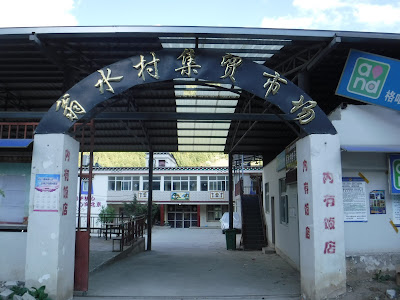





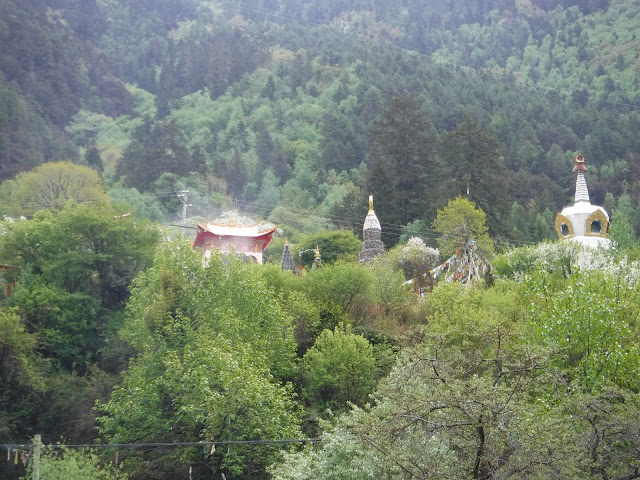

















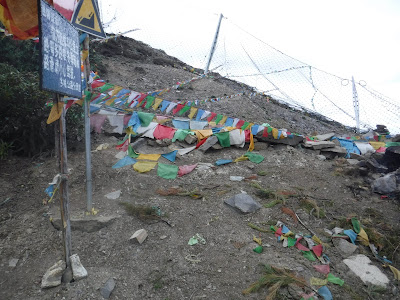



















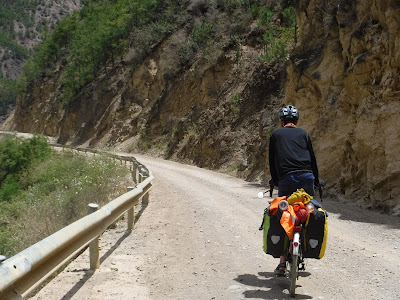









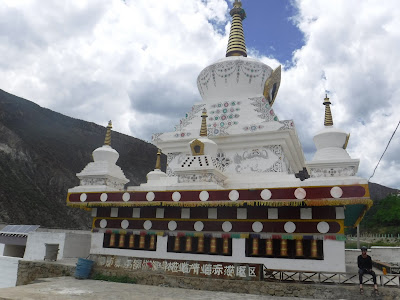















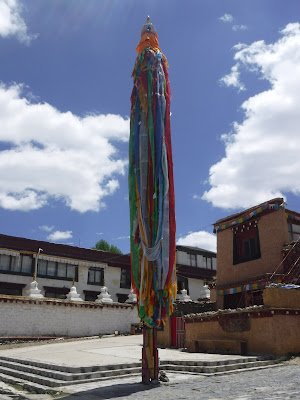












Comments
Post a Comment